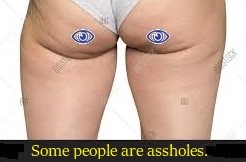The great Japanese World War II air ace, Saburō Sakai, got it right, after the end of the war: "Sakai spoke out against Japanese militarism. He wrote numerous books that were controversial in Japan owing to his criticism of Emperor Hirohito, who cooperated with the militarists.... Sakai also decried the kamikaze program as brutally wasteful of young lives. In Japanese culture, that was risky business, since criticism of superiors is seldom condoned." ("Saburo Sakai: Samurai of the air", Barrett Tillman, 4/12/2018, HISTORYNET)
When the leaders hand out the honors to the heroes who survive their wars, the heroes need to tell the leaders: "Damn you for having made us do it."
* * * * * * *
Honor is [also] dishonor
Honor is [also] dishonor. A person who seeks to feel honored to be honored ia being insecure and sunk in simpleminded tribalism, seeking for their self-image to be propped up by petty people kissing up to them, or by persons "above" them whom they feel themseves to be "less han". It causes persons to demand loss of face (dishonor) from their adversaries instead of seeking reconciliation. "On, come on, Joe. You tried to kill me. Can we get over this and you not try to do it again? Is there something I did to motivate you to do this? If yes, can we try to work it out?"
It's fine for simple persons to enjoy being honored since they know no better. But if "We hold there truths to be self evident, that all men [this word being understood in a non-genderistic way...] are created equal, then, since "honor" is asymmetical, shouldn't more educated individuals seek instead mutual respect with peers?
I have not mentioned the bad thing here: "honor" in the sense of things like "defending the family's honor", which leads to ever escalating feuds like "The Hatfields and Th McCoys". Wars for honor and killing persons such as young ladies who harmlessly have sexual relations which "shame" the family, etc.
Citizen vs. subject
The citizen is a component part of his (her, other's) polity, with the expectation of owing service thereunto; what goes on in his head is of secondary import. The subject is a monadic mind within which its situated polity is just one objectivity among others concerning which to decide how to act in regard to it; what goes on in its political leaders' agenda is of secondary import. The birth rate is of no concern to subjects but of paramount importance to the polity which always desires more citizens to accomplish its agenda du jour: food for powder.
Or the word subject can refer to being an objectivity disposed over by the political power, as in: A subject of The King of England. In this case, too, the person remains a greater measure of individual integrity than does the citizen who has "bought in" to his being a component part of the political entity. I am obliged to give the king such-and-such; I get back from the king this other such-and-such. Is it a good trade-off for me as well a for him?
"Liberté, égalité fraternité." What the hell does that mean? Does it mean being a fraternity member, a person who constellates himself as an actualization agent of the group's agenda du jour, a kamikaze pilot of his own body and mind, a worker bee? A citizen not a subject in either sense of that word as elucidated above?
Individual Я society
It should be obvious that the individual needs society and that society needs the individual, even understanding "society" in a functional not a meata/metaphysical way. Isn't the solution to the potential conflict between the two, the contradiction between selfishness and sacrifice of self ("self-sacrifice") that what benefits the self should also benefit society and that what benefits society should also benefit the self? Win-win. Trivial example: Everybody can get sick. Some people really get off on curing illnesses. It can even be an intellectual challenge for the doctor in difficult cases. Win-win. So what's the problem? Just make every job be like that of the person who loves being a surgeon or internist. Q.E.F.
Listening to Margaret MacMillan's lucid lectures on the world of World War I on Youtube, I hear that the German officer corps had the idea that a rising standard of living made persons value self-preservation over self-sacrifice. So far so good. But they thought this was bad. She talks about their romanticization of "honor" and even dueling in the 19th Century, and their consequent distaste for urban life, reaching to the point of repugnance at too much education and decadence: officers who liked arts such as ballet (and presumably, a fortiori, any officer who would want to become a ballet dancer?. "Drag shows" might be OK because they mock what they portray).
Jamie Harrris writes about Ukraine, "This horrendous aggression is a wake up for all countries and people who care about a democratic way of flife."
Next stop on this train: Better dead than red. How does this differ from celebrating dueling? My attitude (verbatim): "What a crock of shit!" And I hope that even if the hero being celebrated was Imre Nagy not vomitus Zelensky, I would feel much the same denotatively, albeit less disgusted connotatively. Because I propose, aligned with that writer who escaped McCarthyism in USA to East Germany, Bertolt Brecht:
"Student: 'Happy the land that breeds a hero.'
Galileo: 'No. Unhappy the land that needs a hero.'"
The person who raised his voice to celebrate TV Commando Z's selfish aventurism in YAM was not intentionaly celebrating a criminal. He was celebrating what he considered a positive value: Paths of glory that lead but to the grave. I distinguish service before self from: service instead of self (whether for himself alone or also for others who may want no part of it is, of course, an open question as of this writing for me (BMcC[18-11-46-503])).
He would probably have liked the World War I officer Prof. MacMillan said refused to use machine guns because they were not honorable. If I had to be stuck in a war, I would gladly mow down a Charge of the Light Brigade with a gatling gun and maybe just get some grease on my hands. Mow down the heroes, men (and ladies and others...)! I never wanted to mow a lawn. As General George S. Patton said: Nobody ever won a war by dying for their country; you win by getting the poor schmuck on the other side to die for his country. That is not chivalrous, is it?

 Welcome
Welcome

